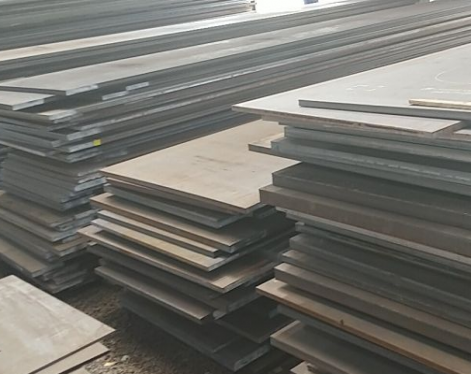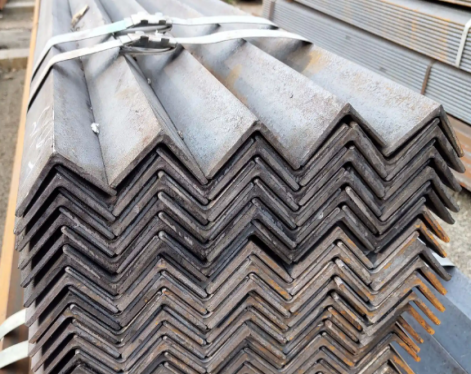The hardness of carbon steel plates depends on different types of steel plates, usually between 120~400HB.
Types of carbon steel plates and their hardness:
Carbon steel plate is one of the commonly used materials at home and abroad. Different types of steel plates also have different hardnesses. Common carbon steel plates include ordinary carbon steel, low alloy high-strength steel, wear-resistant plates, etc.
1. Ordinary carbon steel hardness: generally between 120~300HB.
Ordinary carbon steel is steel with a carbon content of less than 2.11%, and its hardness has a certain relationship with the carbon content. The higher the carbon content in carbon steel, the higher the hardness. Generally, the hardness of ordinary carbon steel plates is between 120~300HB.

2. Hardness of low-alloy high-strength steel: generally between 250~400HB.
The main characteristics of low-alloy high-strength steel are high strength and good wear resistance. It is mainly used in bridges, buildings, ships and other fields. The steel plate hardness of this kind of steel is generally between 250~400HB.
3. Wear-resistant plate hardness: generally between 360~600HB.
Wear-resistant plate is a widely used wear-resistant material. Its main characteristics are high hardness and strong wear resistance. It is mainly used in mining, metallurgy, coal, building materials and other fields. The hardness of wear-resistant steel plates is generally between 360~600HB.
Factors affecting the hardness of carbon steel plates:
In addition to the type of steel plate, there are a few other factors that affect the hardness of carbon steel plates.
1. Quenching hardness: The hardness of the quenched steel plate is higher than that of the unquenched steel plate.
Quenching is a common heat treatment method. Through quenching, the structural structure of steel can be changed, thereby increasing the hardness of steel. In the production process, quenching is generally one of the essential processes.
2. Carbon content: Steel with high carbon content generally has high hardness.
The higher the carbon content in the steel, the harder it is generally. However, too high carbon content can also lead to poor toughness of steel, so use it with caution.
3. Cold work hardening: The hardness of the steel plate will increase slightly after cold working.
During the production process, after the steel plate is cold worked, its density will increase and its hardness will also increase slightly.
Material classification of carbon steel plates:
1. Low carbon steel plate: Carbon content is less than 0.05%. It has good toughness but low strength. It is suitable for occasions requiring impact toughness.
2. Medium carbon steel plate: Carbon content is 0.25%-0.60%, with moderate strength and toughness. It is generally used for mechanical processing, such as axles, gears, etc.
3. High carbon steel plate: The carbon content is above 0.60%-1.00%. It has high strength but poor toughness. It is generally used in occasions requiring high strength, such as springs, saw blades, etc.
In addition to carbon content, the content of other alloying elements such as manganese, silicon, chromium, molybdenum, nickel, etc. will also affect the performance of carbon steel plates. Carbon steel plates of different materials are suitable for different occasions, and the specific selection needs to be determined according to actual needs.
How to detect the hardness of carbon steel plate?
The hardness of carbon steel plates can be detected by universal hardness tester, microhardness tester, ultrasonic hardness tester and other methods. Different detection methods are suitable for different types of carbon steel plates, and it is necessary to choose the appropriate method for detection according to the actual situation.
Conclusion:
The hardness of carbon steel plates depends on different types of steel plates and other factors, usually between 120~400HB. In practical applications, selection should also be made based on specific circumstances.
Types of carbon steel plates and their hardness:
Carbon steel plate is one of the commonly used materials at home and abroad. Different types of steel plates also have different hardnesses. Common carbon steel plates include ordinary carbon steel, low alloy high-strength steel, wear-resistant plates, etc.
1. Ordinary carbon steel hardness: generally between 120~300HB.
Ordinary carbon steel is steel with a carbon content of less than 2.11%, and its hardness has a certain relationship with the carbon content. The higher the carbon content in carbon steel, the higher the hardness. Generally, the hardness of ordinary carbon steel plates is between 120~300HB.

2. Hardness of low-alloy high-strength steel: generally between 250~400HB.
The main characteristics of low-alloy high-strength steel are high strength and good wear resistance. It is mainly used in bridges, buildings, ships and other fields. The steel plate hardness of this kind of steel is generally between 250~400HB.
3. Wear-resistant plate hardness: generally between 360~600HB.
Wear-resistant plate is a widely used wear-resistant material. Its main characteristics are high hardness and strong wear resistance. It is mainly used in mining, metallurgy, coal, building materials and other fields. The hardness of wear-resistant steel plates is generally between 360~600HB.
Factors affecting the hardness of carbon steel plates:
In addition to the type of steel plate, there are a few other factors that affect the hardness of carbon steel plates.
1. Quenching hardness: The hardness of the quenched steel plate is higher than that of the unquenched steel plate.
Quenching is a common heat treatment method. Through quenching, the structural structure of steel can be changed, thereby increasing the hardness of steel. In the production process, quenching is generally one of the essential processes.
2. Carbon content: Steel with high carbon content generally has high hardness.
The higher the carbon content in the steel, the harder it is generally. However, too high carbon content can also lead to poor toughness of steel, so use it with caution.
3. Cold work hardening: The hardness of the steel plate will increase slightly after cold working.
During the production process, after the steel plate is cold worked, its density will increase and its hardness will also increase slightly.
Material classification of carbon steel plates:
1. Low carbon steel plate: Carbon content is less than 0.05%. It has good toughness but low strength. It is suitable for occasions requiring impact toughness.
2. Medium carbon steel plate: Carbon content is 0.25%-0.60%, with moderate strength and toughness. It is generally used for mechanical processing, such as axles, gears, etc.
3. High carbon steel plate: The carbon content is above 0.60%-1.00%. It has high strength but poor toughness. It is generally used in occasions requiring high strength, such as springs, saw blades, etc.
In addition to carbon content, the content of other alloying elements such as manganese, silicon, chromium, molybdenum, nickel, etc. will also affect the performance of carbon steel plates. Carbon steel plates of different materials are suitable for different occasions, and the specific selection needs to be determined according to actual needs.
How to detect the hardness of carbon steel plate?
The hardness of carbon steel plates can be detected by universal hardness tester, microhardness tester, ultrasonic hardness tester and other methods. Different detection methods are suitable for different types of carbon steel plates, and it is necessary to choose the appropriate method for detection according to the actual situation.
Conclusion:
The hardness of carbon steel plates depends on different types of steel plates and other factors, usually between 120~400HB. In practical applications, selection should also be made based on specific circumstances.









